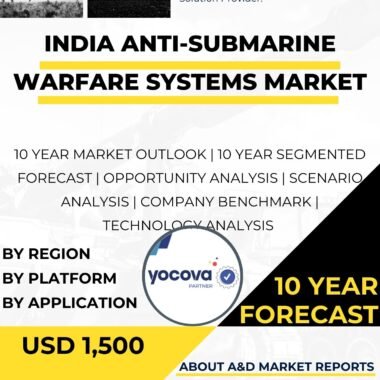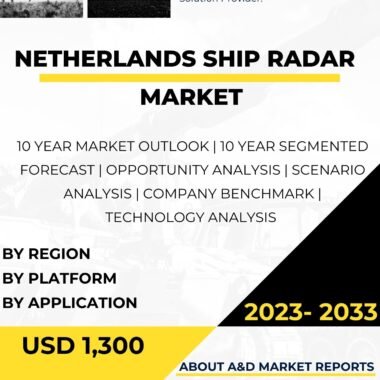Description
Japan ship radar market has gained strong strategic importance as the country strengthens maritime security and navigational safety. As an island nation, Japan depends heavily on maritime trade and secure sea lanes. Therefore, reliable ship radar systems have become essential for both commercial and defense operations. Moreover, increasing regional security challenges have pushed Japan to invest heavily in advanced radar technologies. As a result, research, development, and procurement activities in this market have expanded steadily.
Japan Ship Radar Market by Radar Types and Technologies
The Japan ship radar market covers a wide range of systems used across naval, coast guard, and commercial vessels. These include navigation radars, surveillance radars, and fire control radars. Each radar type serves a distinct operational purpose. Furthermore, modern ship radars use advanced technologies such as phased array systems, pulse compression, and frequency-modulated waveforms. Consequently, detection range, accuracy, and target tracking performance have improved significantly.
Japan Ship Radar Market in Maritime Security and Surveillance
Maritime security remains a key application area in the Japan ship radar market. Surveillance radars installed on naval and coast guard vessels enable continuous monitoring of territorial waters and the exclusive economic zone. As a result, Japan can detect unauthorized vessels and potential threats at an early stage. Moreover, these radar systems support rapid response and enforcement operations. Therefore, ship radars play a critical role in maintaining maritime domain awareness and protecting national interests.
Japan Ship Radar Market in Navigation Safety and Collision Avoidance
In addition to security, the Japan ship radar market plays a vital role in navigational safety. Navigation radars provide real-time information on surrounding vessels, obstacles, and navigational aids. Consequently, they help reduce the risk of collisions in congested sea routes. Furthermore, Japan’s busy ports and narrow waterways increase the need for precise radar-based navigation. As a result, demand for reliable navigation radars continues to rise across merchant and naval fleets.
Japan Ship Radar Market in Naval Combat and Defense Operations
The Japan ship radar market also supports naval combat capabilities. Fire control radars installed on warships enable accurate target detection, tracking, and engagement. Therefore, these systems directly enhance naval operational effectiveness. Moreover, integration with weapons and combat management systems improves response speed and accuracy. As regional maritime tensions increase, advanced fire control radars are becoming increasingly important for naval defense readiness.
Japan Ship Radar Market and Domestic Manufacturing Capabilities
Japan has placed growing emphasis on indigenous defense production within the ship radar market. Consequently, domestic manufacturers are playing a larger role in system development and integration. Government support and defense modernization programs further encourage local innovation. Moreover, collaboration between industry players and research institutions enables the creation of radars tailored to Japan’s operational needs. As a result, domestic production capacity continues to strengthen.
Japan Ship Radar Market and International Partnerships
International cooperation remains a key driver of technological advancement in the Japan ship radar market. In particular, Japan’s alliance with the United States provides access to advanced radar technologies and system integration expertise. Additionally, joint programs enhance interoperability between allied naval forces. Therefore, international partnerships contribute significantly to modernization efforts while strengthening regional maritime security cooperation.
Japan Ship Radar Market and Technological Advancements
Technological progress continues to reshape the Japan ship radar market. For instance, advancements in radar signal processing and electronic scanning have improved detection accuracy and clutter suppression. Moreover, radar miniaturization allows easier integration on smaller vessels. As a result, ship radars now offer higher performance with lower power consumption. These improvements enhance both operational flexibility and lifecycle efficiency.
Japan Ship Radar Market Challenges and Electronic Warfare Risks
Despite strong growth, the Japan ship radar market faces several challenges. Electronic warfare threats are a major concern, as adversaries may attempt to jam or deceive radar systems. Therefore, developing robust electronic protection and counter-countermeasure capabilities is essential. Moreover, maintaining radar effectiveness in contested environments requires continuous upgrades and testing.
Japan Market and Spectrum Management Issues
Efficient spectrum management is another critical challenge in the Japan ship radar market. Radar systems must operate alongside communication and navigation equipment without causing interference. Consequently, careful frequency coordination is required. Furthermore, compatibility with other onboard systems is essential for seamless operations. As a result, integration planning has become a key focus area for naval architects and system integrators.
Japan Market and System Integration Requirements
Integration with combat management systems and communication networks is vital for maximizing radar effectiveness. Therefore, ship radars must function as part of a unified naval system. Moreover, real-time data sharing improves situational awareness and command decision-making. As Japan modernizes its fleet, integrated radar solutions are gaining priority.
Japan Market Outlook
Overall, the Japan ship radar market is expected to experience sustained growth. Demand is driven by maritime security needs, navigational safety requirements, and naval modernization programs. Consequently, ship radars will remain central to Japan’s maritime defense strategy. Moreover, continued investment in domestic manufacturing, advanced technologies, and international cooperation will support long-term market expansion. Addressing electronic warfare risks and integration challenges will be essential to maintaining operational superiority and regional stability.




